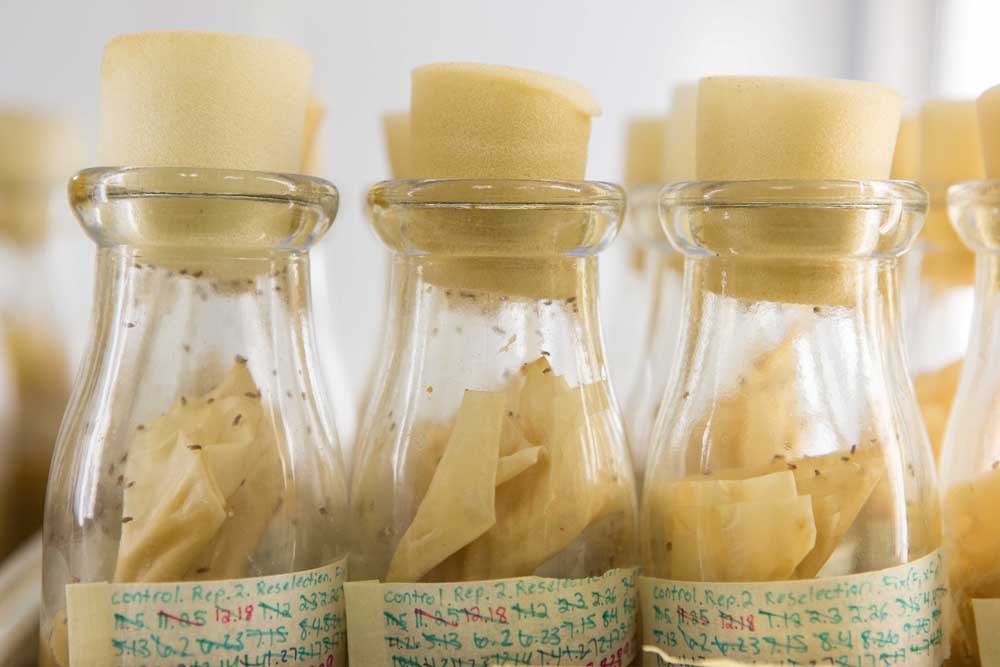Dad’s nutrition affects baby, too
Published 6:30 am Friday, November 3, 2017

- Bottles of fruit flies used in the University of Cincinnati study on paternal nutrition on display in a lab.(Submitted photos)
Kent Thornburg, a prominent nutrition researcher, has made it a practice throughout his career to lecture adolescent girls and young women on the importance of healthy eating to help prevent certain diseases in their children.
In recent years, he’s broadened his message to include another group: males.
“Diets for adolescent boys and young men are really important and we should be telling them, as we have been telling girls, that their lifestyle and their diets will make a difference in the health of their offspring,” said Thornburg, director of Oregon Health & Science University’s Bob and Charlee Moore Institute for Nutrition & Wellness. “There is no doubt about that now.”
Research over decades has described the powerful effects a mother’s nutrition has on her children. It influences their likelihood of developing diabetes, cancer, hypertension, obesity and a number of other serious conditions. In more recent years, studies have slowly accumulated suggesting that a father’s nutrition plays a role in his children’s health as well.
The reason it’s taking so long to learn about paternal nutrition’s effect on health is because it’s much subtler than maternal nutrition’s effect, Thornburg said. After all, the mother provides the environment — and with that, all the nutrients — for the developing baby.
While a mother and father each contribute half of their baby’s genes, their own health statuses exert epigenetic changes during the baby’s development, which is when the expression of certain genes gets turned on or off, resulting in diseases down the road. Picture the genes as a code for the blueprint that makes a person’s body and epigenetics as a powerful force that can modify that code, Thornburg said.
The father’s effect on the baby is more limited: only through the contribution of sperm during the reproductive process, which, studies have shown, also imparts epigenetic changes on the baby similar to the mother’s egg.
“Those are more subtle effects — not because they’re less important — but because they are much harder for researchers to detect,” Thornburg said.
Studies on the subject mostly take place on animals with similar genetic codes to humans, and the findings are extrapolated to humans. Not only would it be logistically difficult to gather tissue samples from humans as they develop, ethics prevents scientists from feeding parents unhealthy diets before and during pregnancies.
Researchers from the University of Cincinnati recently teamed up with scientists in Australia and Norway to study if paternal nutrition could have an effect on whether embryos die in the womb.
At first blush, their subjects might seem the furthest thing from humans: fruit flies. But actually, the bugs share 60 percent of their genes with humans. They also reproduce quickly.
In the study, all female flies received the same cornmeal diet.
The male flies were divided into groups that received varying levels of diets: from healthy to very unhealthy diets high in calories and carbohydrates and low in protein.
“That wouldn’t be considered a good, balanced diet,” said Josh Benoit, an assistant professor of biological sciences in UC’s McMicken College of Arts and Sciences. “That would be a diet where you’re likely going to be gaining weight and probably be more toward the obese spectrum.”
After 17 days of the flies’ respective diets, each male fly mated with two female flies. The results were interesting. Poor diets corresponded with greater rates of embryo loss, but that effect was only evident if it was the fly’s second mating.
The researchers weren’t sure exactly why mating order made a difference in embryo loss but suspected that it had to do with changes in ejaculate quality or other epigenetic effects, Benoit said.
In their study, published last month in the journal Proceedings of the Royal Society B, the researchers noted that in humans, embryonic mortality prior to implantation in the uterine wall may account for a “striking” 30 percent of conceptions.
Benoit said his results could potentially apply to other animals, including humans, although it’s too early to say whether paternal nutrition can affect embryonic mortality in people.
“It’s not that far of a stretch,” he said. “A lot of the things they see happening in flies happens in humans as well.”
Similarly, a 2016 study in the journal Breast Cancer Research found that the female offspring of male rats fed lard, which is high in saturated fat, had higher rates of breast cancer than the female offspring of male rats fed diets of corn oil, which is high in polyunsaturated fat.
“These novel data show that paternal high-fat diets influence their female offspring’s susceptibility to mammary cancer, with consumption of lard increasing and corn oil reducing daughters’ mammary cancer risk,” the researchers wrote. “Thus, paternal diet before conception sets a stage for a daughter’s risk of developing breast cancer.”
Last year, a group of Tufts University researchers published a study in the journal PLoS One that found male mice with both too little and too much Vitamin B had female offspring with larger intestinal tumors and higher risks for elevated cholesterol than the offspring of mice with normal Vitamin B, or folic acid, levels.
While other research has shown that fathers’ unhealthy macronutrient levels — carbohydrates, protein and calories — can negatively affect their offspring, this was the first to show that even unhealthy micronutrient levels can have effects, too, said Jimmy Crott, an author on the study and associate professor in Tufts University’s Friedman School of Nutrition Science and Policy.
The PLoS One study also served as a reminder that, while lots of people are undernourished, getting too much of certain vitamins can also be harmful.
“In nutrition we see this kind of a lot where we see kind of a bell-shaped curve where too little of a nutrient is bad and you get a sweet spot with kind of intermediate intake and then a high intake is also bad,” Crott said.
While that’s true, Thornburg said he’s far more concerned about the many people who aren’t getting enough nutrients. “The bigger problem that we have to face in the health of our population is not related to people over consuming supplements, it’s underconsuming nutrients,” he said.
Also important, Thornburg said, is the message that paternal nutrition doesn’t just begin when a man decides to start a family. It begins when boys being actively making sperm, which happens around ages 11 or 12.
Good nutrition needs to start then — in boys and girls alike.
“People have published books on this,” he said, “that women, before they become pregnant, should eat a good diet for weeks or months before they get pregnant. But we know now that it needs to start in adolescence both for men and women.”
— Reporter: 541-383-0304,
tbannow@bendbulletin.com
At first blush, their subjects might seem the furthest thing from humans: fruit flies. But actually, the bugs share 60 percent of their genes with humans.






